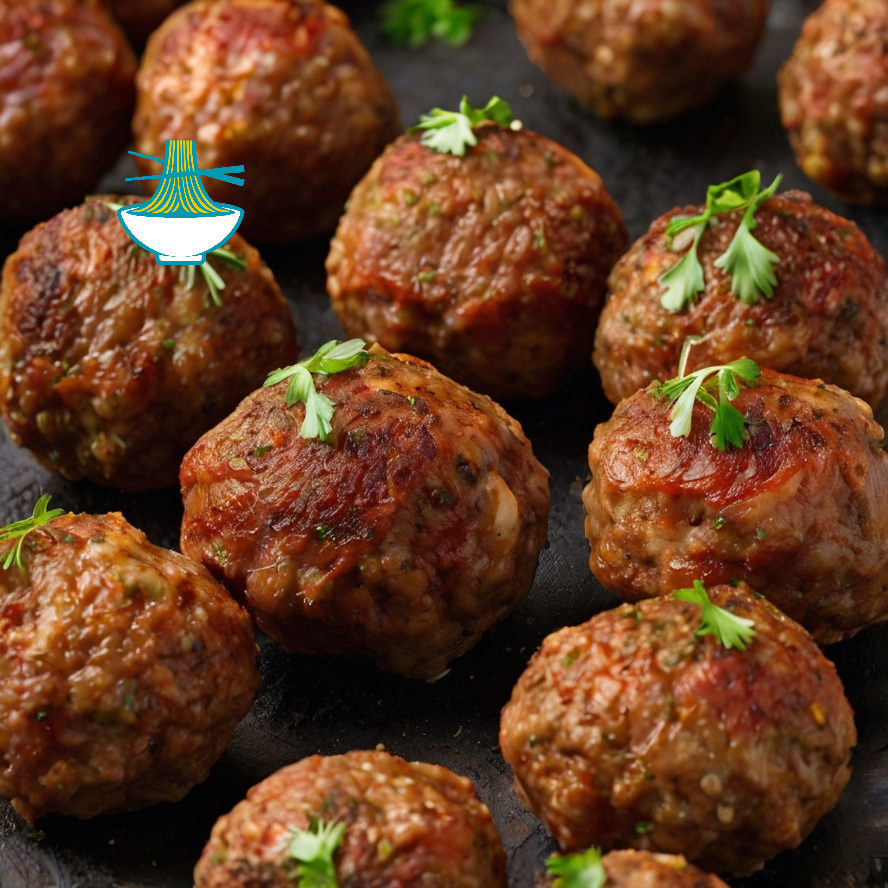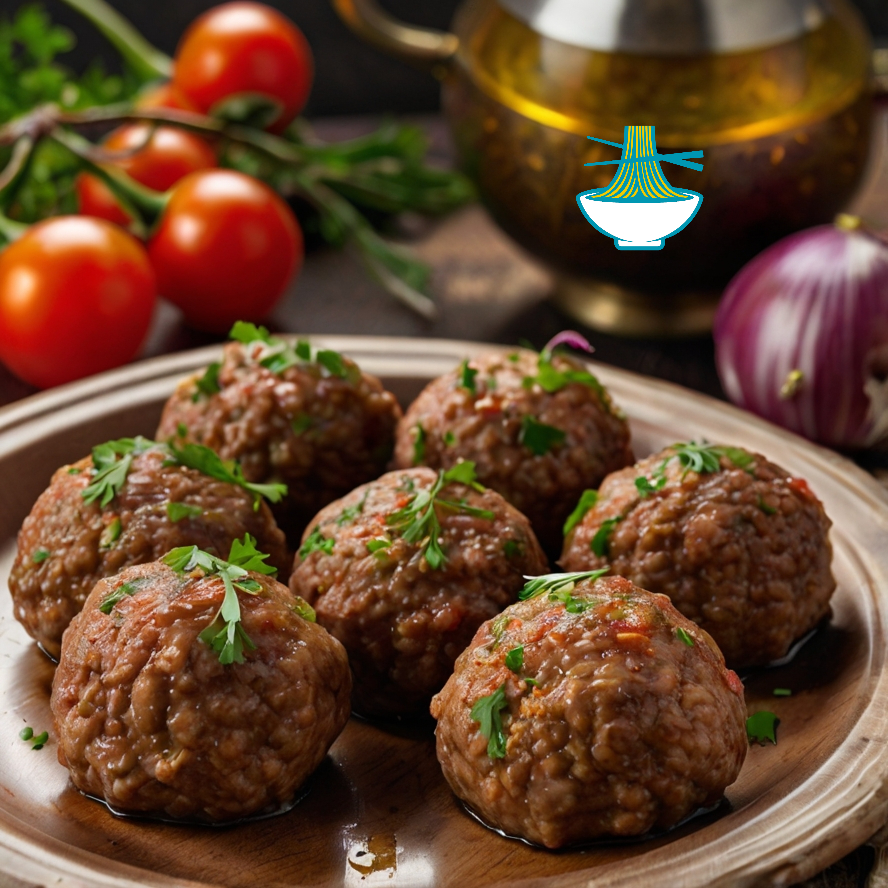Kefta: A delectable dish of spiced ground meat, often beef or lamb, shaped into balls or patties, then grilled or fried. Originating from the Middle East and North Africa, it has a rich history dating back centuries. This versatile recipe has evolved over time, incorporating various regional spices and ingredients to create a flavorful culinary experience.
Ingredients:
- 1 pound ground beef or lamb
- 1 small onion, finely chopped
- 2 cloves garlic, minced
- 1/4 cup fresh parsley, finely chopped
- 1 teaspoon ground cumin
- 1 teaspoon paprika
- 1/2 teaspoon ground coriander
- 1/4 teaspoon cinnamon
- Salt and pepper to taste
Preparation:
1. In a large bowl, combine the ground meat, chopped onion, minced garlic, parsley, cumin, paprika, coriander, cinnamon, salt, and pepper.
2. Mix the ingredients thoroughly until well combined.
3. Shape the mixture into small balls or flatten them into patties, depending on your preference.
4. Preheat your grill or skillet over medium-high heat.
5. If grilling, place the kefta balls or patties onto the grill and cook for about 4-5 minutes per side, or until cooked through.
6. If frying, heat some oil in a skillet over medium heat. Cook the kefta balls or patties for about 4-5 minutes per side, or until browned and cooked through.
7. Once cooked, serve the kefta hot with your favorite sides and enjoy!
Nutrition Value:
1. 1 pound ground beef or lamb
- Calories: Approximately 1200-1300 kcal
- Carbohydrates: 0g
- Protein: Approximately 100g
- Fat: Approximately 80-100g
- Sodium: Varies depending on processing, approximately 80-100mg
- Cholesterol: Approximately 300-400mg
- Nutritional benefits: Excellent source of protein, iron, zinc, and B vitamins. However, high in saturated fats and cholesterol, so should be consumed in moderation as part of a balanced diet.
2. 1 small onion, finely chopped
- Calories: Approximately 10-20 kcal
- Carbohydrates: Approximately 2-4g
- Protein: Approximately 0-1g
- Fat: 0g
- Sodium: Varies, typically low
- Cholesterol: 0mg
- Nutritional benefits: Good source of dietary fiber, vitamin C, and antioxidants. Onions also contain small amounts of vitamins B6 and folate.
3. 2 cloves garlic, minced
- Calories: Approximately 5-10 kcal
- Carbohydrates: Approximately 1-2g
- Protein: Approximately 0-1g
- Fat: 0g
- Sodium: Varies, typically low
- Cholesterol: 0mg
- Nutritional benefits: Garlic is rich in sulfur compounds like allicin, which have various health benefits, including potential antioxidant and antimicrobial properties. It also contains small amounts of vitamin C, vitamin B6, and manganese.
4. 1/4 cup fresh parsley, finely chopped
- Calories: Approximately 5-10 kcal
- Carbohydrates: Approximately 1-2g
- Protein: Approximately 0-1g
- Fat: 0g
- Sodium: Varies, typically low
- Cholesterol: 0mg
- Nutritional benefits: Parsley is rich in vitamins K, C, and A. It also contains antioxidants such as flavonoids and carotenoids. Additionally, parsley provides small amounts of calcium, iron, and folate.
5. 1 teaspoon ground cumin
- Calories: Approximately 8-10 kcal
- Carbohydrates: Approximately 1-2g
- Protein: Approximately 0-1g
- Fat: 0-1g
- Sodium: Varies, typically low
- Cholesterol: 0mg
- Nutritional benefits: Cumin is a good source of antioxidants and may have anti-inflammatory properties. It also contains small amounts of iron and magnesium.
6. 1 teaspoon paprika
- Calories: Approximately 6-10 kcal
- Carbohydrates: Approximately 1-2g
- Protein: Approximately 0-1g
- Fat: 0-1g
- Sodium: Varies, typically low
- Cholesterol: 0mg
- Nutritional benefits: Paprika is rich in vitamin A, vitamin E, and antioxidants like beta-carotene. It also contains small amounts of vitamin C and vitamin B6.
7. 1/2 teaspoon ground coriande
- Calories: Approximately 4-6 kcal
- Carbohydrates: Approximately 1g
- Protein: Approximately 0-1g
- Fat: 0-1g
- Sodium: Varies, typically low
- Cholesterol: 0mg
- Nutritional benefits: Coriander contains antioxidants, vitamins A and K, and small amounts of minerals like calcium, potassium, and magnesium.
8. 1/4 teaspoon cinnamon
- Calories: Approximately 2-3 kcal
- Carbohydrates: Approximately 1g
- Protein: 0g
- Fat: 0g
- Sodium: Varies, typically low
- Cholesterol: 0mg
- Nutritional benefits: Cinnamon is rich in antioxidants and may have anti-inflammatory properties. It also contains small amounts of calcium and manganese.
9. Salt and pepper to taste
- Calories: Negligible
- Carbohydrates: Negligible
- Protein: Negligible
- Fat: Negligible
- Sodium: Varies depending on the amount used
- Cholesterol: 0mg
- Nutritional benefits: Salt adds flavor and may help with electrolyte balance in the body, but excessive consumption can contribute to high blood pressure. Pepper contains small amounts of vitamins A and C, as well as antioxidants.
Remember, these nutritional values are approximate and can vary based on factors like portion size, specific ingredients used, and cooking methods. It's always a good idea to consult a registered dietitian for personalized dietary advice.


Comments